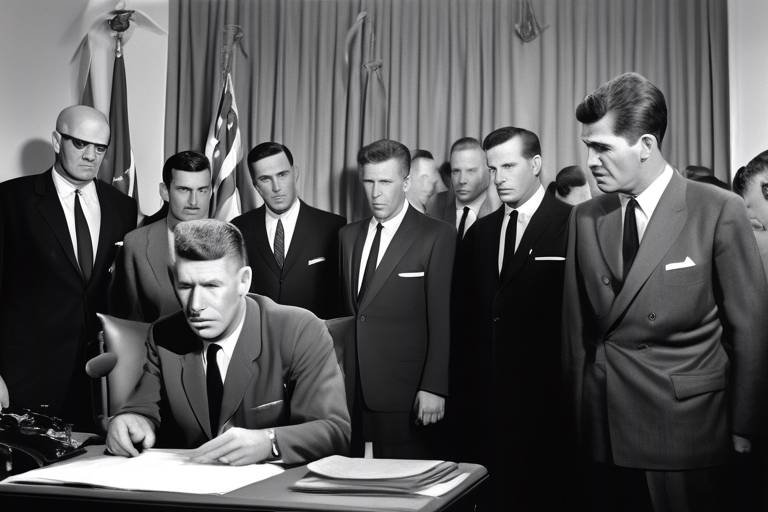The Role of the Enlightenment in Shaping Modern Society
The Enlightenment era, a period of intellectual flourishing in the 17th and 18th centuries, played a pivotal role in shaping the foundation of modern society as we know it today. This transformative period marked a shift towards reason, individualism, and progress, influencing contemporary societal structures, values, and governance.

Origins of the Enlightenment
Exploring how the Enlightenment era influenced contemporary societal structures, values, and governance, shaping the foundation of modern civilization.
The Enlightenment, also known as the Age of Reason, emerged in the 17th and 18th centuries as a transformative intellectual movement that challenged traditional beliefs and embraced rationality and scientific inquiry. Rooted in the Scientific Revolution, this period saw a shift towards valuing reason, logic, and empirical evidence in understanding the world.

Key Thinkers and Philosophies
The Enlightenment era was a breeding ground for revolutionary ideas and influential thinkers who reshaped the intellectual landscape of their time. Among the key figures that emerged during this period were Voltaire, Rousseau, and Locke, each contributing unique perspectives on reason, liberty, and progress that continue to resonate in contemporary society.
Voltaire, known for his wit and advocacy for freedom of speech, challenged the authority of the church and monarchy, promoting the values of tolerance and individual rights. His philosophical works, such as "Candide," critiqued social injustices and irrational beliefs, inspiring generations to question established norms and seek knowledge.
Rousseau, on the other hand, emphasized the importance of the social contract and the general will of the people in forming a just society. His ideas on education, equality, and the innate goodness of humanity influenced political thought and social movements, laying the groundwork for modern democratic principles.
Locke, a proponent of natural rights and limited government, argued that individuals possess inherent rights to life, liberty, and property. His concept of the social contract and the right to rebel against oppressive rulers shaped the foundation of modern constitutional governance and the protection of individual freedoms.
These thinkers and their philosophies not only challenged the traditional structures of power and authority but also paved the way for the advancement of human rights, democracy, and the pursuit of knowledge. Their legacy continues to inspire critical thinking, social progress, and the ongoing quest for a more just and enlightened society.

Impact on Political Systems
The Enlightenment era had a profound impact on political systems, revolutionizing the way societies were governed and laying the groundwork for modern democratic principles. Philosophers like Voltaire, Rousseau, and Locke challenged the existing monarchical systems and advocated for the rights of the individual and the importance of popular sovereignty. Their ideas on democracy, human rights, and the separation of powers between government branches have shaped the political structures we see today.
Enlightenment ideals emphasized the importance of a social contract between the rulers and the ruled, promoting the idea that governments should be based on the consent of the governed. This concept of popular sovereignty challenged the absolute authority of monarchs and paved the way for the establishment of constitutional democracies and representative governments.
The Enlightenment also played a crucial role in the development of modern concepts of human rights. Philosophers argued for the protection of individual liberties and freedoms, such as freedom of speech, religion, and assembly. These ideas laid the foundation for the recognition of universal human rights and the establishment of legal frameworks to protect them.
Furthermore, the Enlightenment's emphasis on reason and rationality in decision-making influenced the idea of the rule of law and the need for checks and balances in government. The concept of the separation of powers, as proposed by thinkers like Montesquieu, aimed to prevent the concentration of power in the hands of a single individual or institution, thus safeguarding against tyranny and promoting accountability.
Overall, the Enlightenment's impact on political systems was transformative, leading to the establishment of more inclusive and participatory forms of governance that prioritized the rights and freedoms of individuals. The legacy of these Enlightenment ideals can be seen in the democratic institutions and principles that underpin modern societies around the world.

Social Reforms and Equality
Exploring how the Enlightenment era influenced contemporary societal structures, values, and governance, shaping the foundation of modern civilization.
The Enlightenment era was a pivotal period in history that advocated for social reforms and equality, challenging traditional norms and hierarchies. It sparked a movement towards greater individual freedoms, social justice, and equality among all members of society.
One of the key aspects of the Enlightenment's impact on social reforms was its emphasis on the rights of individuals and the belief in the inherent equality of all human beings. Thinkers like Rousseau and Voltaire promoted the idea that every person should have equal rights and opportunities, regardless of their social status or background.
Furthermore, the Enlightenment played a significant role in advocating for the abolition of slavery and the promotion of gender equality. Philosophers and activists of the time argued that all individuals should be treated with dignity and respect, irrespective of their race or gender.
Through the Enlightenment's emphasis on reason and rationality, it challenged oppressive social structures and promoted the idea of a more just and equitable society. This movement towards social reforms and equality laid the groundwork for future revolutions and movements that sought to address injustices and promote human rights.
In essence, the Enlightenment era was a catalyst for societal transformation, pushing boundaries and advocating for a more inclusive and egalitarian society where every individual has the opportunity to thrive and contribute to the greater good.

Scientific Revolution and Rational Thinking
Exploring how the Enlightenment era influenced contemporary societal structures, values, and governance, shaping the foundation of modern civilization.
The Scientific Revolution during the Enlightenment period marked a significant shift in how society viewed the world. It emphasized the importance of empirical evidence, reason, and critical thinking in understanding natural phenomena. Thinkers like Galileo Galilei and Isaac Newton challenged traditional beliefs and paved the way for modern scientific inquiry.
This era promoted a rational approach to knowledge, encouraging individuals to question existing dogmas and seek logical explanations for observed phenomena. The scientific method, with its emphasis on experimentation and observation, became a cornerstone of scientific progress and innovation.
Furthermore, the Enlightenment's focus on rational thinking extended beyond the realm of science to influence other areas of society. It encouraged people to apply logical reasoning and evidence-based arguments in various aspects of life, from politics and philosophy to everyday decision-making.
The Scientific Revolution not only revolutionized scientific disciplines but also had profound implications for society as a whole. It laid the groundwork for modern technological advancements, medical breakthroughs, and a deeper understanding of the natural world.
By promoting rational thinking and empirical evidence, the Enlightenment fostered a culture of intellectual curiosity and innovation that continues to shape our understanding of the world today.
1. What were some key scientific advancements during the Enlightenment period?
2. How did the Scientific Revolution contribute to the development of modern scientific methodologies?
3. In what ways did the Enlightenment promote rational thinking in society?
4. How did the Scientific Revolution influence the relationship between science and religion?
5. What role did key figures like Galileo Galilei and Isaac Newton play in the Scientific Revolution?

Cultural and Artistic Transformations
During the Enlightenment era, the cultural and artistic landscape underwent profound transformations, reflecting the shift towards reason, individualism, and innovation. Artists and writers embraced new ideas and philosophies, using their creative expressions to challenge traditional norms and explore the complexities of human existence.
One of the key aspects of cultural transformation during the Enlightenment was the emphasis on rationality and intellectual inquiry in artistic endeavors. Artists sought to depict the world in a more realistic and objective manner, moving away from the fantastical and idealized representations of previous eras. This shift towards realism and authenticity can be seen in the works of painters like Jacques-Louis David, who used art as a tool for social and political commentary.
Furthermore, the Enlightenment's focus on individualism and personal expression had a significant impact on literature and music. Writers such as Voltaire and Rousseau challenged traditional authority figures through their writings, advocating for freedom of thought and expression. Similarly, composers like Mozart and Beethoven infused their music with emotion and complexity, breaking away from conventional forms and structures.
The Enlightenment also sparked a wave of innovation and creativity in the arts, leading to the emergence of new artistic movements and styles. The neoclassical movement, for example, drew inspiration from classical antiquity and emphasized clarity, order, and symmetry in art and architecture. This style reflected the Enlightenment's belief in the power of reason and the importance of balance and harmony in society.
Overall, the cultural and artistic transformations of the Enlightenment era laid the foundation for modern artistic expression and creativity. By challenging traditional norms, embracing rationality, and celebrating individualism, artists and thinkers of the time paved the way for the diverse and dynamic cultural landscape we see today.

Legacy of the Enlightenment
Exploring how the Enlightenment era influenced contemporary societal structures, values, and governance, shaping the foundation of modern civilization.
Tracing the historical context and intellectual roots of the Enlightenment movement in the 17th and 18th centuries.
Examining influential figures like Voltaire, Rousseau, and Locke, and their ideas on reason, liberty, and progress that continue to impact society today.
Analyzing how Enlightenment ideals of democracy, human rights, and separation of powers have shaped modern political structures and governance.
Discussing the Enlightenment's role in advocating for social justice, equality, and individual freedoms, leading to significant societal changes.
Exploring the connection between the Enlightenment and the scientific revolution, promoting empirical evidence, reason, and critical thinking.
Examining how Enlightenment values influenced literature, art, and music, fostering creativity and innovation in the arts.
The legacy of the Enlightenment continues to shape the fabric of modern society, weaving its principles into the tapestry of education, human rights, and global progress. It serves as a beacon of intellectual freedom and rationality, guiding individuals and nations towards enlightenment and progress. The emphasis on reason, individual rights, and the pursuit of knowledge has left an indelible mark on the world, inspiring generations to strive for a better, more enlightened future.
Addressing criticisms and challenges to Enlightenment values in the modern world, and the ongoing debate over their relevance and application.

Challenges to Enlightenment Ideals
Challenges to Enlightenment ideals have emerged in the modern era, raising questions about the applicability and relevance of these foundational principles in today's complex world. One significant challenge is the tension between individual rights and collective welfare. While Enlightenment philosophy emphasized the importance of individual freedoms and autonomy, contemporary issues such as global pandemics and environmental crises have highlighted the need for collective action and sacrifice for the greater good.
Moreover, the concept of universal human rights, a cornerstone of Enlightenment thought, faces challenges in a culturally diverse and politically fragmented world. The idea of a universal moral code is often questioned in the face of cultural relativism and differing ethical perspectives across societies. Balancing cultural diversity with the pursuit of human rights remains a delicate and contentious issue in the modern age.
Another key challenge to Enlightenment ideals lies in the realm of technological advancement and surveillance. The rapid development of technology has raised concerns about privacy, government surveillance, and the manipulation of information. The tension between individual privacy rights and national security interests underscores the complexities of applying Enlightenment principles in the digital age.
Furthermore, the rise of populist movements and authoritarian regimes presents a direct challenge to Enlightenment values of democracy, freedom of expression, and the rule of law. The erosion of democratic institutions, attacks on press freedom, and the resurgence of nationalist ideologies pose a threat to the progress made towards a more just and equitable society.
In navigating these challenges, it is essential to critically evaluate the enduring relevance of Enlightenment ideals in shaping modern society. While the core principles of reason, liberty, and progress remain fundamental to the advancement of civilization, adapting these ideals to address contemporary complexities requires thoughtful reflection and dynamic engagement with evolving societal dynamics.
Frequently Asked Questions
- What was the Enlightenment era?
The Enlightenment era, also known as the Age of Reason, was a period in the 17th and 18th centuries marked by a focus on reason, science, individualism, and skepticism of traditional authority. It emphasized intellectual and cultural developments that led to significant changes in philosophy, politics, science, and society.
- Who were some key figures of the Enlightenment?
Some influential thinkers of the Enlightenment include Voltaire, Rousseau, Locke, Montesquieu, and Kant. These philosophers and writers advocated for principles such as freedom of thought, equality, and the separation of powers, which continue to influence modern society.
- How did the Enlightenment impact political systems?
The Enlightenment promoted ideas of democracy, individual rights, and the rule of law, which laid the foundation for modern political systems. Concepts like the social contract, popular sovereignty, and the division of powers were central to the development of democratic governance.
- What was the Enlightenment's view on science and rational thinking?
The Enlightenment emphasized the importance of empirical evidence, reason, and scientific inquiry. It encouraged a shift towards rational thinking and a questioning of traditional beliefs, leading to advancements in fields such as mathematics, physics, and biology.
- What is the legacy of the Enlightenment in contemporary society?
The Enlightenment left a lasting impact on modern society by promoting values such as individual rights, freedom of speech, and the pursuit of knowledge. Its influence can be seen in areas like education, human rights, and the principles of democracy and secularism.



















